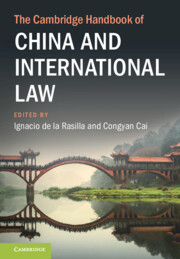Book contents
- The Cambridge Handbook of China and International Law
- The Cambridge Handbook of China and International Law
- Copyright page
- Contents
- Figures
- Contributors
- Foreword
- Acknowledgements
- Abbreviations
- Introduction
- Part I Taking Centre Stage in Global Governance and the International Legal Order
- Part II Interfaces between National and International Law
- Part III Selected Areas of Chinese State Practice
- Part IV International Peace and Security
- Part V Human-Centred International Law
- Part VI The Habitat and the Global Commons
- Part VII International Economic Law
- 20 China and International Trade Law
- 21 China
- 22 China and International Intellectual Property Law
- 23 Chinese Multilateralism in International Financial Law
- Part VIII International Dispute Settlement
- Index
20 - China and International Trade Law
Rising from Within the System or Always an Outlier?
from Part VII - International Economic Law
Published online by Cambridge University Press: 04 January 2024
- The Cambridge Handbook of China and International Law
- The Cambridge Handbook of China and International Law
- Copyright page
- Contents
- Figures
- Contributors
- Foreword
- Acknowledgements
- Abbreviations
- Introduction
- Part I Taking Centre Stage in Global Governance and the International Legal Order
- Part II Interfaces between National and International Law
- Part III Selected Areas of Chinese State Practice
- Part IV International Peace and Security
- Part V Human-Centred International Law
- Part VI The Habitat and the Global Commons
- Part VII International Economic Law
- 20 China and International Trade Law
- 21 China
- 22 China and International Intellectual Property Law
- 23 Chinese Multilateralism in International Financial Law
- Part VIII International Dispute Settlement
- Index
Summary
This chapter critically examines the People’s Republic of China’s engagement with international trade law from the perspectives of rule-taking and rule-making, including China’s pre-reform planned economy-based trade regime, its voluntary internalization of global trade rules in the decade before its World Trade Organization (WTO) accession, trade reform to comply with WTO rules, the China–US trade war (in violation of international trade law) and the Chinese position on WTO reform. It argues that, in its reform and opening-up period (1978–present), China has largely been a rule-taker and a responsible – albeit possibly reluctant at times – status quo power in the United States-led, West-dominated international economic system. On the other hand, it has also taken an instrumentalist approach to international trade law with a foreign trade policy pragmatically oriented towards achieving a balance between trade liberalization and protectionism based on calculated uses of industrial policy tools and non-tariff barriers to support selected domestic industries.
Keywords
- Type
- Chapter
- Information
- The Cambridge Handbook of China and International Law , pp. 397 - 422Publisher: Cambridge University PressPrint publication year: 2024

